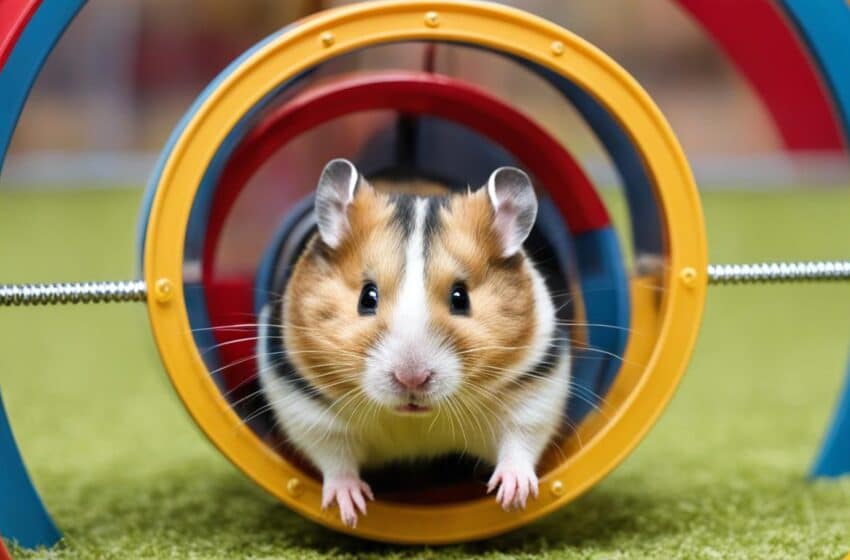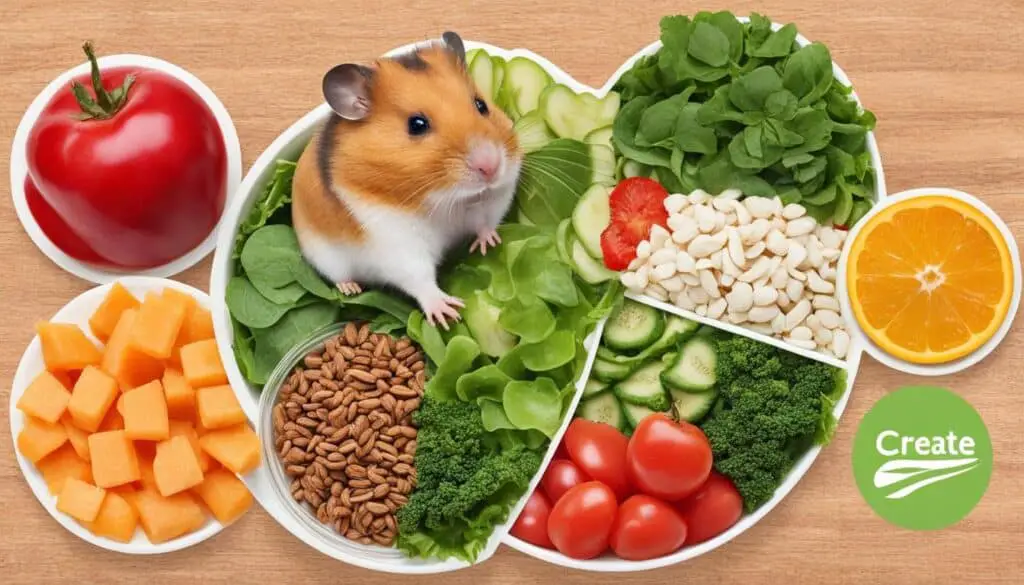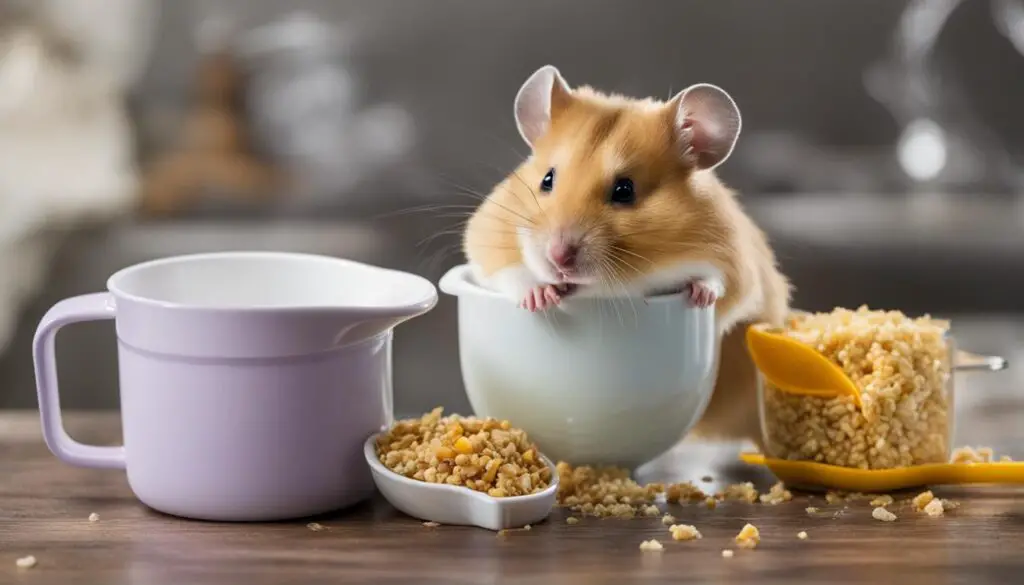Diet and Exercise Tips for Overweight Hamsters

As a concerned hamster owner, it’s important to understand the impact of diet and exercise on your furry friend’s health. Research from the American Association of Small Animal Practitioners shows that overweight hamsters are at risk for various health issues, including diabetes, heart disease, and joint problems. To ensure their well-being, it’s crucial to provide a balanced diet and regular exercise to help them maintain a healthy weight. Additionally, the Royal Society for the Prevention of Cruelty to Animals advises taking preventive measures to ensure that hamsters do not become overweight in the first place.
Key Takeaways:
- Overweight hamsters are at risk for various health issues.
- A balanced diet and regular exercise are essential for maintaining a healthy weight.
- Preventive measures should be taken to avoid hamster obesity.
- Feeding hamsters a well-balanced diet is crucial, including high-quality food pellets, fresh vegetables, and limited treats.
- Portion control and a feeding schedule are necessary to prevent overeating.
Understanding Hamster Nutritional Needs
When it comes to caring for our furry friends, understanding their nutritional needs is crucial. Hamsters, like any other pet, require a well-balanced diet to maintain optimal health. In this section, I will discuss the nutritional requirements of hamsters and provide guidance on creating a suitable hamster diet.
The Importance of a Balanced Diet
To meet the nutritional needs of hamsters, it is essential to provide a combination of high-quality hamster food pellets, fresh vegetables, and occasional treats. Hamster food pellets serve as the foundation of their diet, as they contain essential nutrients that support their overall well-being. These pellets are specifically formulated to meet the dietary requirements of hamsters, ensuring they receive the necessary vitamins, minerals, and protein.
However, it is also important to include fresh vegetables in their diet to provide additional nutrients and variety. Vegetables such as lettuce, carrots, and broccoli can be offered in small amounts as a supplement to the pellet-based diet. These vegetables not only provide valuable vitamins and fiber but also serve as a source of hydration for hamsters.
While treats can be an enjoyable addition to a hamster’s diet, it is crucial to exercise caution. Foods high in sugar, fat, or salt should be avoided, as they can contribute to obesity and other health issues. Treats should be offered sparingly and as an occasional indulgence rather than a regular part of their diet.
Properly balancing a hamster’s diet is key to ensuring they receive all the necessary nutrients while preventing the risk of nutritional deficiencies or obesity. Implementing a well-rounded diet plan that incorporates the appropriate amounts of pellets, vegetables, and treats will help maintain your hamster’s overall health and vitality.
Providing Optimal Nutrition
Choosing the right hamster food pellets is essential in meeting their nutritional needs. Look for reputable brands that specifically cater to hamsters, ensuring that the pellets contain a balanced mix of nutrients. Consult with a veterinarian or experienced hamster owner to determine the best pellet brand for your pet.
In addition to pellets, it is essential to ensure your hamster has access to fresh and clean water at all times. A water bottle with a sipper tube is ideal, as it prevents water from spilling and getting contaminated. Regularly check the water bottle to ensure it is functioning properly and refill it as needed.
Expert Tip:
“Remember, hamsters have specific nutritional needs that differ from other pets, so it’s important to provide them with a diet that caters to their requirements.”

Portion Control for Overweight Hamsters
When dealing with overweight hamsters, it is important to monitor their food intake and practice portion control. By being mindful of their portion sizes, owners can help their hamsters maintain a healthy weight and reduce the risk of obesity-related health issues.
The British Small Animal Veterinary Association recommends measuring the amount of food given each day and adjusting it based on the hamster’s weight and body condition. This ensures that the hamster receives an appropriate amount of food that meets their nutritional needs without overfeeding. Portion control is especially crucial for overweight hamsters, as it helps restrict calorie intake and promotes weight loss.
Establishing a feeding schedule with set meal times can also contribute to portion control. By offering meals at specific times throughout the day, hamsters learn to anticipate and eat their meals more efficiently. This prevents overeating and encourages a healthier eating habit.
Additionally, consider using a hamster food bowl with portion markers to ensure accurate measurements. These bowls often have measurement lines inside, making it easier to control the amount of food given. As a general guideline, hamsters usually require 1-2 tablespoons of food per day, depending on their breed and size.
Remember to observe your hamster’s eating behavior and adjust the portion sizes accordingly. If your hamster consistently finishes their food and appears hungry, you may need to slightly increase the portion size. Conversely, if there is leftover food after each meal, you may need to decrease the portion size. Regular monitoring and adjustments are essential to ensure your hamster’s portion control is effective in managing their weight.
Benefits of Portion Control for Overweight Hamsters
Implementing portion control for overweight hamsters offers several benefits:
- Weight Management: Portion control allows you to regulate your hamster’s calorie intake and promote weight loss, helping them achieve a healthy weight.
- Prevention of Overeating: By setting specific meal times and portion sizes, you can prevent your hamster from overeating, which can lead to obesity and associated health problems.
- Individualized Nutrition: Adjusting portion sizes based on your hamster’s weight and body condition ensures they receive the appropriate amount of food tailored to their specific needs.
By practicing portion control and establishing a feeding schedule, you can play a vital role in helping your overweight hamster achieve a healthier weight and improve their overall well-being.
| Portion Control Tips for Overweight Hamsters |
|---|
| Avoid free-feeding and provide measured portions of food each day. |
| Use a hamster food bowl with portion markers to ensure accurate measurements. |
| Observe your hamster’s eating behavior and adjust portion sizes accordingly. |
| Establish a feeding schedule with set meal times to prevent overeating. |
| Consult a veterinarian for personalized portion control recommendations based on your hamster’s specific needs. |

Incorporating Exercise into a Hamster’s Routine
Providing opportunities for exercise is crucial for overweight hamsters. Regular physical activity helps them burn calories and improve overall fitness. The Royal Society for the Prevention of Cruelty to Animals suggests creating a stimulating environment to encourage hamsters to engage in physical activity.
One way to promote exercise is by providing tunnels, wheels, and toys in the hamster’s habitat. These additions not only offer mental stimulation but also encourage physical movement. Hamsters love to explore and run through tunnels, keeping them active and engaged.
“A stimulating environment with tunnels, wheels, and toys is instrumental in encouraging physical activity in hamsters.”
A suitable exercise wheel is essential for a hamster’s physical activity routine. It is important to choose a wheel that is the right size for the hamster, allowing them to run without causing any strain or discomfort. A proper wheel size prevents potential injuries and promotes safe exercise habits.
| Physical Activity Tips for Overweight Hamsters |
|---|
| Provide tunnels, wheels, and toys to create a stimulating environment. |
| Choose a suitable exercise wheel that allows safe running. |
| Supervise exercise sessions to prevent overexertion. |
| Ensure hamsters engage in sufficient physical activity without straining themselves. |
It is important to supervise hamsters during their exercise sessions to ensure they are engaging in sufficient physical activity but not overexerting themselves. Monitoring their behavior and observing signs of fatigue or stress is crucial to avoid any potential health risks.
Regular exercise is beneficial not only for weight management but also for the overall well-being of hamsters. By incorporating exercise into their routine, hamster owners can help their pets lead an active and healthy lifestyle.
Tracking Progress and Seeking Veterinary Guidance
Keeping track of a hamster’s weight is essential in managing their weight loss journey. Regular weigh-ins can help track progress and identify any potential health concerns. If a hamster is not losing weight or is experiencing other issues, it is crucial to consult a veterinarian. They can provide further guidance, recommend dietary adjustments or specialized diets, and conduct a thorough health examination to rule out any underlying conditions contributing to the weight problem.
Weighing Tips for Hamsters
When weighing your hamster, it is important to use a small, accurate scale designed for pets. Place the scale on a flat, stable surface and ensure that it is free from any objects or distractions. Gently place your hamster on the scale and wait for the weight to stabilize before recording the measurement.
Benefits of Veterinary Consultation
Seeking veterinary guidance for your overweight hamster is crucial for their overall health and well-being. The veterinarian can assess the hamster’s weight and body condition, evaluate any underlying health issues, and provide a personalized weight management plan. They may also recommend specific dietary modifications, portion control strategies, or additional exercise options to help your hamster reach and maintain a healthy weight.
Expert Advice for Overweight Hamsters
“Weight monitoring is vital for hamsters struggling with obesity. By regularly consulting with a veterinarian, hamster owners can receive tailored advice, gain insight into potential underlying causes, and address any health concerns promptly.”
Signs Requiring Veterinary Consultation
| Signs | Description |
|---|---|
| Consistently gaining weight despite dietary changes | This could indicate an underlying health condition that requires veterinary attention. |
| Difficulty moving or exercising | If your hamster is lethargic or showing signs of pain, it is important to consult a veterinarian to rule out joint or musculoskeletal issues. |
| Changes in eating or drinking habits | An abrupt decrease in appetite or increase in thirst could indicate an underlying health problem. |
| Unexplained changes in behavior | If your hamster is showing abnormal behaviors such as excessive grooming, aggression, or depression, it may be a sign of an underlying health issue requiring veterinary attention. |
Conclusion
Maintaining a healthy weight and lifestyle for your hamster is vital to ensure their overall well-being. By implementing the right diet and exercise strategies, you can help your furry friend achieve and maintain a healthy weight, reducing the risk of obesity-related health issues. Remember to provide a balanced diet consisting of high-quality hamster food pellets, fresh vegetables, and limit high sugar, fat, or salt foods that can contribute to weight gain.
Practicing portion control by measuring the amount of food given and establishing a feeding schedule can prevent overeating and promote a healthier weight. Additionally, incorporate opportunities for exercise into your hamster’s daily routine by providing stimulating environments with tunnels, wheels, and toys. Supervise their physical activity and ensure they engage in enough exercise without overexerting themselves.
It’s essential to track your hamster’s progress by regularly weighing them to monitor weight loss and identify any potential health concerns. Remember, if your hamster is not losing weight or experiencing other issues, seek veterinary guidance. A veterinarian can provide further advice, recommend specialized diets or dietary adjustments, and conduct a thorough health examination to address any underlying conditions contributing to the weight problem.
With proper care and attention to their weight management and healthy lifestyle, your hamster can live a long, happy, and fulfilling life. Prioritize their well-being by providing a balanced diet, practicing portion control, offering opportunities for exercise, monitoring progress, and seeking professional advice when needed.
FAQ
How should I feed my overweight hamster?
It is important to provide a well-balanced diet for overweight hamsters. Offer high-quality hamster food pellets as the main component of their diet, along with small amounts of fresh vegetables like lettuce, carrots, and broccoli. Avoid feeding them foods high in sugar, fat, or salt.
How can I practice portion control with my overweight hamster?
Measuring the amount of food given each day and adjusting it according to the hamster’s weight and body condition is recommended. Establishing a feeding schedule with set meal times can also help prevent overeating and promote a healthier weight for your hamster.
What can I do to encourage exercise in my overweight hamster?
Creating a stimulating environment with tunnels, wheels, and toys will encourage physical activity in your hamster. Make sure they have access to a suitable exercise wheel that allows them to run comfortably. Supervise their exercise sessions to ensure they engage in enough physical activity without overexerting themselves.
How do I track my overweight hamster’s weight loss progress?
Regular weigh-ins can help monitor your hamster’s weight loss journey and identify any potential health concerns. If your hamster is not losing weight or experiencing other issues, consult a veterinarian who can provide further guidance and conduct a thorough health examination.
What is the importance of maintaining a healthy weight and lifestyle for hamsters?
Maintaining a healthy weight and lifestyle is crucial for the overall well-being of hamsters. By following proper diet and exercise tips, hamster owners can help their pets achieve and maintain a healthy weight, reducing the risk of obesity-related health issues and ensuring a long and happy life for their furry friends.



